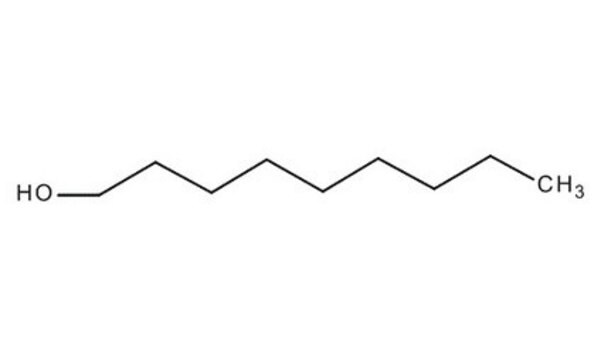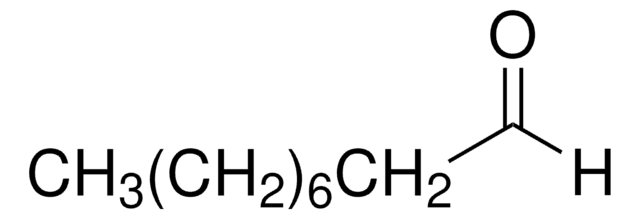W278904
Nonyl alcohol
≥98%, FCC
Synonym(s):
1-Nonanol, Alcohol C9, Nonyl alcohol
About This Item
Kosher
Recommended Products
biological source
synthetic
Quality Level
grade
Halal
Kosher
Agency
meets purity specifications of JECFA
reg. compliance
FCC
FDA 21 CFR 172.515
vapor density
5 (vs air)
vapor pressure
13 mmHg ( 104 °C)
Assay
≥98%
refractive index
n20/D 1.433 (lit.)
bp
215 °C (lit.)
mp
−8-−6 °C (lit.)
density
0.827 g/mL at 25 °C (lit.)
application(s)
flavors and fragrances
Documentation
see Safety & Documentation for available documents
food allergen
no known allergens
Organoleptic
citrus; floral
SMILES string
CCCCCCCCCO
InChI
1S/C9H20O/c1-2-3-4-5-6-7-8-9-10/h10H,2-9H2,1H3
InChI key
ZWRUINPWMLAQRD-UHFFFAOYSA-N
Looking for similar products? Visit Product Comparison Guide
Application
- Synthesis, X-ray crystal structures, thermal and electrochemical properties of thiosemicarbazidatodioxouranium(VI) complexes.: The article details the synthesis and characterization of uranium complexes involving Nonyl alcohol. The study provides insights into the structural and electrochemical properties of these complexes, contributing to the field of coordination chemistry. (Sahin et al., 2010).
Disclaimer
Signal Word
Warning
Hazard Statements
Precautionary Statements
Hazard Classifications
Aquatic Chronic 3 - Eye Irrit. 2
Storage Class Code
10 - Combustible liquids
WGK
WGK 2
Flash Point(F)
208.4 °F - closed cup
Flash Point(C)
98 °C - closed cup
Personal Protective Equipment
Choose from one of the most recent versions:
Already Own This Product?
Find documentation for the products that you have recently purchased in the Document Library.
Our team of scientists has experience in all areas of research including Life Science, Material Science, Chemical Synthesis, Chromatography, Analytical and many others.
Contact Technical Service









